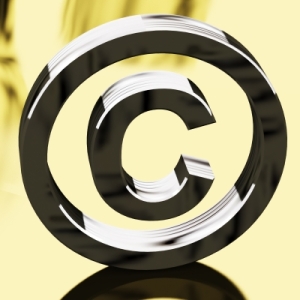This got me to thinking… One of the most basic ways we can protect ourselves is by registering our copyrights with the Library of Congress. But should we?
After doing some research, I believe it is. But first, I must add this disclaimer—I’m not a lawyer and I’m no expert. I got my information from the Copyright Office website, other blogs and articles on the issue of copyright law and protection. I’ll add the list links to the bottom.
I know what most of you are thinking… The moment we write an idea down, it is now ours and is copyrighted. It belongs to the writer, so why go through the hassle and expense of registering it?
But here’s the answer why we should:
MONEY!
And I’m not talking about the $35.00-$45.00 it takes to register the work. I’m talking about statutory damages. If you don’t register your copyright, you can’t sue for statutory damages! You can still sue, but if your copyright isn’t registered, you will have to:
- Prove the work is yours and was yours long before the infringement happened. Relying on a “Poor man’s copyright” won’t cut it in court if the other person is claiming YOU are the infringer.
- Pay for your lawyer and the court costs.
- You CANNOT sue the infringer for money!
- The proof is now on the infringer, but since you have registered your copyright, you have all the proof that it is yours.
- The infringer pays for your lawyer and court costs.
- You CAN sue them for money!
Okay, someone reads this book thinks it the next Harry Potter or Twilight but needs a little help (it needs editing and the writing needs cleaned up—BUT story is still yours!) She takes your characters, your world and basically your story—her only contribution was editing. She self-pubs this book and makes a fortune! She gets a book deal from the biggest of the NY 6 and a movie deal…She’s rolling in the money on your idea!
Here’s what will happen if you have registered your copyright. You contact the Copyright Office and file that there has been an infringement. You hire a lawyer and file a lawsuit. The thief can’t prove she’s done more than edited the book and promoted the hell out of it. You win the case and she ends up having to pay all the court costs and you millions—Remember this is the next Harry Potter.
Now, here’s what happens if you do not have your work registered. Oh, you can still sue, but now you must prove the work is yours… Easy, you say, because you always send yourself a copy of the work—a “poor-man’s copyright.” Well, this doesn’t hold up in court. Even if the court decides the work was yours, you don’t have the right to sue for damages! Basically, all you can come away from your lawsuit with is a piece of paper saying “yes, the work is yours” and a bill for the court costs. Sure, our thief may be ordered to cease and desist, but she gets to keep the millions that should have been yours.
Boy, to me that $35 bucks and the PIA paperwork sure doesn’t seem so bad now.
But this isn’t just for the self-published to be aware of. My first book will come out this year published by The Wild Rose Press. They put the notice of copyright in the front of the book, but they do not register the copyright. If I want the copyright registered, I must do it on my own. Read your contracts and ask questions. If the work isn’t registered, I’d suggest doing so… Don’t assume you can register it later. You can, but if there is an infringement, you must prove the book is yours, and that can a real PAIN.
Sources:
http://www.copyright.gov/help/faq/faq-general.html
http://learn.lawline.com/video/why-is-it-important-to-register-a-work-with-the-copyright-office/
http://www.seomoz.org/blog/why-you-should-go-through-the-trouble-of-registering-your-copyright-when-everyone-tells-you-that-you
http://womeninbusiness.about.com/od/copyrightlaws/f/FAQlaw-should.htm
http://law.freeadvice.com/intellectual_property/copyright_law/register_work_copyright_protection.htm
Photo Credit: © Stuart Miles

11 comments:
WOW..awesome information Sara! Thank you for all your research and taking the time to share. So sad that someone would steal anothers work, but also good for the original author to stay on top of things and spend that little extra to protect their hard work.
Wow - I heard about this but didn't know much. Consider me educated! Thank you for sharing all that you learned.
Thanks for the info, Sara! Piracy is horrible, and so many authors are burned every year.
Great post,
Neecy
Great information Sara! Thanks for this.
Thanks for writing this, Sara! It's true - the 'poor man's copyright' only gives a date to what you created...it doesn't do much for the court system, unfortunately.
Sara~
THANKS!
Great information, and one more thing to consider.
Thank you!!!! I'm definitely looking into this!
VERY good post! Yeah and the poor man's copyright used to be the thing but is no longer applicable.
Great reminder especially for those who get published through epubs.
Thanks everyone for stopping by!
I have three books out and they are copyrighted, and I have the paperwork to prove it. But, I have a short story that isn't copyrighted, and I'm wondering if I should have done it, too.
Great post, Sara.
Post a Comment